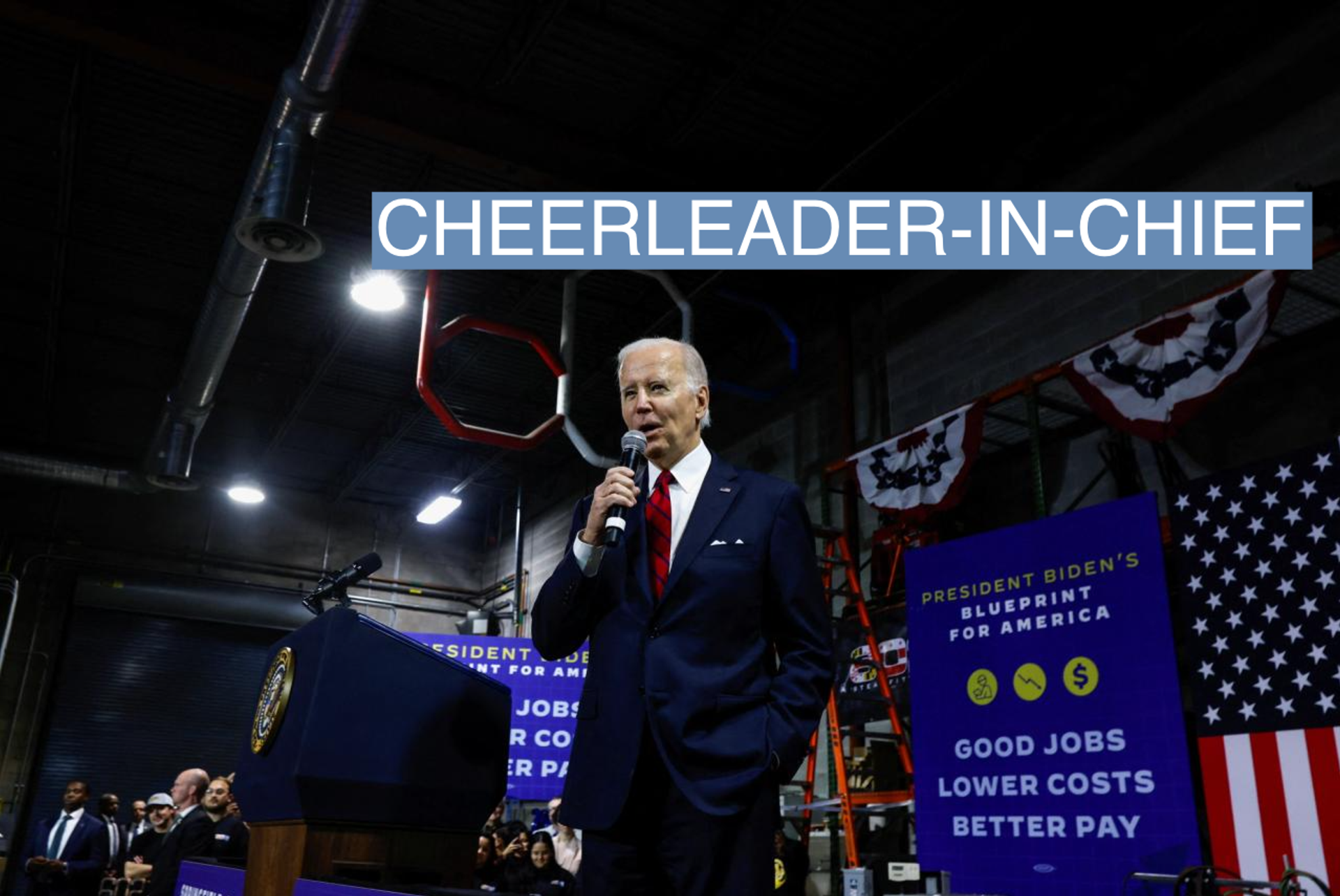The Facts

President Biden is aggressively pitching his administration as an economic success story as he prepares to run for re-election, even if voters aren’t quite ready to hear it yet.
The president recently offered a taste of his rah rah message during a speech in Virginia last week, where he ticked off a slew of upbeat recent news on hiring, jobs, wages, and inflation before a crowd of union steamfitters. “The Biden economic plan, because of you all, is actually working,” he said. “It’s working.”
Biden, senior staff, and allied lawmakers have continuously highlighted new high-tech battery plants tied to the Inflation Reduction Act’s tax credits, new tunnels and roads funded by the infrastructure law, and gas prices down from their peak with help from the strategic petroleum reserve. The unemployment rate is at a 50-year low, normally cause for a celebration.
For now, however, it’s a contrarian pitch to voters whose views of the economy are overwhelmingly dim. A CBS News poll last month found only 28% of respondents rated the economy as “good,” in line with other surveys.
In this article:
Jordan’s view
The administration might be right, though. While there’s plenty of uncertainty, some recent signs suggest that the U.S. could be drifting toward a so-called soft landing, in which inflation cools without an economic downturn. If those trends continue, it’s possible voters will start to notice, however slowly.
First, the economy finished off 2022’s roller coaster ride relatively strong, growing at a 2.9% annual rate in the fourth quarter. Corporate earnings have been healthy, too.
Second: Inflation looks like it may finally be easing up (please knock on wood). Over the last 6 months, the Consumer Price Index has risen at just under a 2% annual rate. Even setting aside bouncing food and gasoline prices, consumer prices have significantly decelerated in the past three months, and slowing rent hikes will likely help going forward. The year-over-year inflation numbers that feature so heavily in cable news chyrons should also start looking much better once last year’s spikes are in the rearview mirror.
Even as job growth remains strong, wage growth is creeping down toward a normal pace, easing fears of a “wage-price spiral” in which businesses pass more labor costs onto consumers, who demand higher pay in return.
Third: The Fed is sounding ever slightly more dovish these days. The biggest immediate concern about the economy at the moment is that the central bank’s rapid interest rate increases, aimed at quelling inflation, will also tip the country into a recession. Chair Jerome Powell announced a quarter percentage point rate increase on Wednesday, its smallest since march, and signaled that markets should expect more. But he also celebrated the fact that the “disinflationary process has started,” said he still saw a path to a soft landing, and left open the possibility the Fed could ease up on its rate hikes if inflation keeps improving quickly.
The spate of good news has led even some notorious economic pessimists to change their tune. Former Treasury Secretary Larry Summers, who last summer argued that the U.S. might need a year of 10% unemployment to beat inflation, recently said he thought chances were rising that the country might avoid a recession after all.
Room for Disagreement
Notwithstanding some negative headlines on layoffs at major tech firms and a weird egg shortage, economic analysts mostly concede there have been positive developments lately. But they still aren’t confident it will stay that way much longer. Retail sales have sagged, manufacturing is contracting, higher interest rates have socked the housing market, and leading recession indicators in the bond market have been flashing red.
Professional forecasters see a 65% chance of recession in the year ahead, according to the latest Bloomberg survey of economists; 98% of American CEOs surveyed by the Conference Board anticipate the same. On this topic, the White House is at odds with both popular and elite opinion.
Even if we do tame inflation and avoid a downturn, it’s still unclear whether voters will give Biden credit for a growing, healthy economy. After all, 46% of the country — and 39 percent of Democrats — believe we are currently in a recession even as the job market is historically strong. Americans might not be ready to move on from their brush with forty-year-high inflation, in which case Biden might need to be ready with a backup pitch for that second term.
Notable
- Economic forecasting has always been “more of an art than a science,” Bloomberg explains, and the bizarre post-pandemic economy has arguably made it harder than ever to nail.